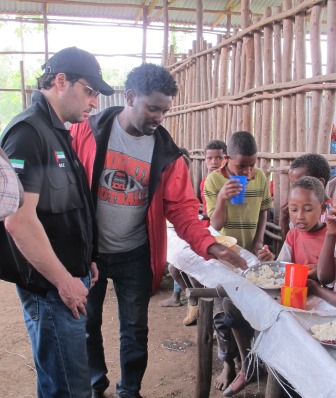 The cost and efficiency savings that can be made by governments through integrating school health and nutrition interventions is one of the key findings of an innovative research programme in Ethiopia's Southern Nations and Nationalities People's Region (SNNPR).
The cost and efficiency savings that can be made by governments through integrating school health and nutrition interventions is one of the key findings of an innovative research programme in Ethiopia's Southern Nations and Nationalities People's Region (SNNPR).
The
Enhanced School Health Initiative (ESHI) research programme which has been measuring the effectiveness of implementing multiple health and nutrition interventions in schools,
found that cost savings of up to 14% could be made when transport, storage and management were shared across interventions.
The ESHI programme which is running across 30 schools in the region includes a
Home Grown School Feeding (HGSF) component, which provides hot, nutritious school meals procured from local smallholder farmers and prepared by locally trained caterers; a school-based deworming component, which distributes safe and effective deworming pills to children to treat parasitic intestinal infections; and finally, a water and sanitation component which improves the latrine and water supplies of the participant schools.
The programme, which is funded by
Dubai Cares, is a collaboration between
Imperial College London's Partnership for Child Development (PCD) along with the Ethiopian Government, the
World Food Programme (WFP),
SNV, and the
Ethiopian Public Health Institute (EPHI).
The ultimate aim of the programme is to build the evidence base for government's to design and implement large-scale comprehensive school health programmes which will improve the health and education of school-aged children.
To this end the programme has already had a significant impact, and the Ethiopian Government is building on the findings to inform the development of its national school health and nutrition policies and programmes. The HGSF model employed by ESHI has been adopted by the
National School Feeding Strategy with four other regions in the country drawing up implementation plans. Data and research findings from the programme have also been used to inform Ethiopia's National Parasite Prevalence Mapping and the National School-based Deworming Programme.

The integrated approach, as informed by ESHI, and which involves stakeholders from multiple sectors including health, education and agricultural was endorsed in the National School Health and Nutrition Strategic Plan recently launched by the Ethiopian Government.
Speaking following a recent visit to SNNPR by Dubai Care's Chief Executive Officer, Mr Tariq Al Gurg (pictured right) said, ''I am very impressed by the progress made by the Ministry of Education to push the school health and nutrition agenda forward and I'm delighted the ESHI programme has contributed to the learning''.
Further information

